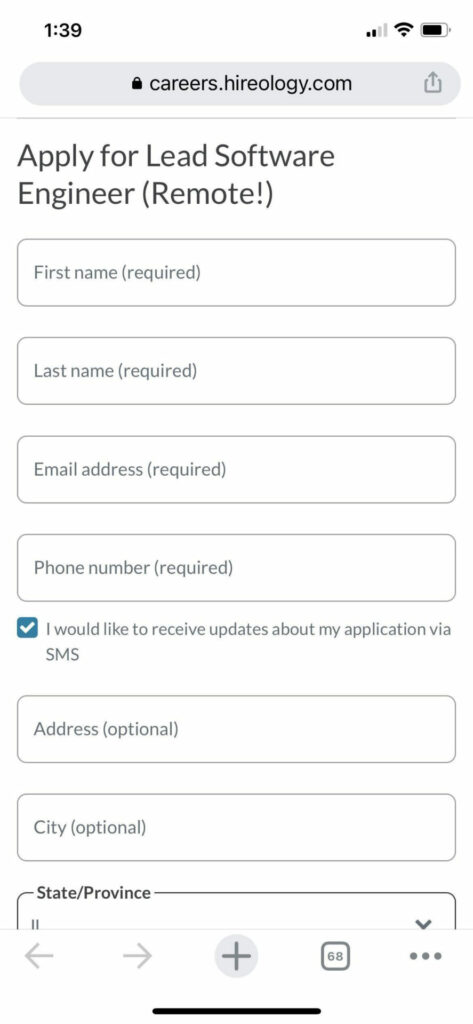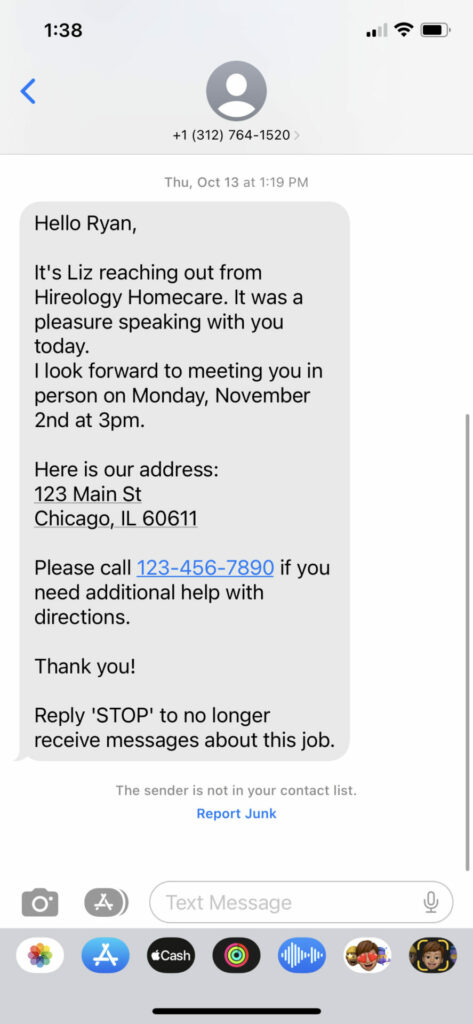Texting is a critical channel for communicating with candidates and keeping your hiring process steps moving faster, but are your texting practices compliant?
In the US, the Telephone Consumer Protection Act (TCPA) and the Federal Communications Commission (FCC) have established guidelines and regulations for businesses that want to communicate with individuals via text message, including those related to recruiting. Hireology has you covered by ensuring candidates and employees have an easy way to opt-in and opt-out of text messages across each of our products.
It’s important to prioritize texting compliance alongside your security and trust policies to protect yourself from potentially costly legal issues related to non-compliance with the TCPA and other applicable regulations, and to build trust and transparency with your job candidates and employees. This can help establish a positive brand reputation and create a better candidate experience — ultimately leading to better recruitment outcomes.
Let’s dig into more about the TCPA, what types of messages it applies to, and how Hireology keeps you compliant.
What is TCPA?
The Telephone Consumer Protection Act (TCPA) regulates telemarketing calls, auto-dialed calls, pre-recorded calls, text messages, and unsolicited faxes. It requires businesses to obtain prior express written consent from individuals before sending them any marketing or solicitation messages via text message. TCPA also includes several additional requirements when it comes to the content of messages sent.
To ensure compliance with the TCPA and FCC regulations, follow these best practices when texting candidates:
-
- Obtain prior express written consent from the candidate before sending any text messages.
-
- Clearly identify yourself and your company in the text message.
-
- Provide an opt-out mechanism in every message, such as “reply STOP to unsubscribe.”
-
- Limit the frequency and content of your messages to only what is necessary and relevant to the job opportunity.
-
- Keep records of all consent and communication for future reference.
-
- Use a texting platform that has built-in compliance tools to ensure that you are following all applicable regulations.
By following these best practices, you can ensure that you’re complying with the regulations surrounding text messaging in the US, while still being able to communicate effectively and efficiently with job candidates.
Example opt-in statement:
“Reply YES to receive text message updates about job opportunities from [company name]. Message and data rates may apply. Consent not required for employment.”
Example opt-out statement:
“Reply STOP to opt out of future messages from [company name]. For help, reply HELP. Message and data rates may apply.”
It’s important to note that these examples are just templates and should be customized to fit the specific requirements of your organization, as well as comply with applicable laws and regulations. The opt-in statement should include a clear explanation of the purpose of the text messages and the opt-out statement should provide a simple and easy way for job candidates to unsubscribe from receiving messages.
What is the difference between marketing-related texts and recruiting-related texts?
The main difference between marketing-related texts and recruiting-related texts is the purpose for which they are sent.
Marketing-related texts are sent with the purpose of promoting a product or service, generating sales, or driving traffic to a website. These texts are typically sent to customers or potential customers who have opted in to receive marketing messages from the business.
Recruiting-related texts, on the other hand, are sent with the purpose of recruiting job candidates or communicating with existing employees about job-related matters. These texts are typically sent to job candidates or employees who have given prior express written consent to receive such messages from the employer or recruiter.
While both marketing-related texts and recruiting-related texts are subject to the same laws and regulations, such as the TCPA and the FCC guidelines, there are some differences in how they are treated under these regulations. For example, marketing-related texts require businesses to obtain prior express written consent from individuals before sending any marketing or solicitation messages to them via text message. This means that businesses must provide a clear and conspicuous disclosure to the individual that they are agreeing to receive such messages, and that the individual must provide their signature, either physically or electronically, to give their consent.
In contrast, recruiting-related texts are subject to a more relaxed standard under the TCPA, which allows for oral consent in certain situations, such as when the individual provides their cell phone number on a job application. However, it’s still best practice to obtain prior express written consent from job candidates before sending them any text messages related to job opportunities or recruitment.
How Hireology’s product complies with TCPA
Hireology’s platform offers several avenues for communicating with applicants, candidates, or existing employees via text. Our SMS feature allows for both one-off and mass text messaging with candidates. We also offer a TextApply feature that gives job seekers the option to apply to open roles via text. And finally, within Hireology Referrals you can send text message campaigns to existing employees about your referral program.
As noted above, the TCPA requires employers to meet certain criteria when using features like this to send any employment-related text message. Thankfully, Hireology is built to help you remain compliant. Whether you’re sending a one-to-one text, a mass text, Hireology ensures that you meet all TCPA requirements by:
-
- Requiring applicants to opt-in or -out of texting when they submit an application
-
- Providing an opt-out mechanism in every message
-
- Maintaining records of all messages sent to applicants and candidates
- Offering guidance and best practices around the content and frequency of texts sent to candidates


Interested in learning more about how our candidate texting capabilities can help you achieve your hiring goals? Hear directly from our customers!




